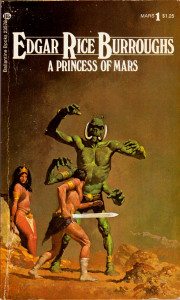 Edgar Rice Burroughs is a master of the pulpiest of early 20th century pulp fiction, best known for his Tarzan series, with his Barsoom series, i.e. John Carter’s adventures on Mars, a close second. His stories must be read with at least a little distance, given the sexism and racism of the era running rampant through them. But if you’re able to accept that different times spawned different notions of manly men and womanly women and noble or not so noble savages, Burroughs’s work is a lot of fun.
Edgar Rice Burroughs is a master of the pulpiest of early 20th century pulp fiction, best known for his Tarzan series, with his Barsoom series, i.e. John Carter’s adventures on Mars, a close second. His stories must be read with at least a little distance, given the sexism and racism of the era running rampant through them. But if you’re able to accept that different times spawned different notions of manly men and womanly women and noble or not so noble savages, Burroughs’s work is a lot of fun.
I’d only ever read a couple of his Tarzan books before recently reading A Princess of Mars, the first in his Barsoom series (published in 1917). It’s an absurd book. Its disregard for logic and internal consistency is breathtaking. It bogs down a bit with its long descriptive passages and tiresome heroics, but Burroughs’s imagination trumps his narrative weaknesses. He was one of the first to write anything like this, a space fantasy/western set on an alien planet. Many imitators would follow.
For example: George Lucas owes Burroughs his career. Sure, Lucas claims the Flash Gordon serials of the ’30s as the inspiration for Star Wars, but there’s an awful lot of Burroughs in there.
No one ever made a movie out of the Barsoom series because of the special effects required: an alien planet, alien cities, and thousands of 15 foot tall, four-armed warrior aliens, among other dastardly beasts. Serious efforts were made beginning in the ‘80s, but not until 2012 did we get the movie version, titled inanely: John Carter. Because who in 2012 doesn’t know instantly who John Carter is?
Oh, right. Everyone. And A Princess of Mars? What was wrong there? No one who isn’t a Disney executive knows. John Carter of Mars was the working title, but word is that Disney noted the failure of recent movies with “Mars” in the title, and thus shot themselves in their tiny little mouse-brain.
Many, many versions of this movie were written over the years. The final one is credited to Pixar director Andrew Stanton (of Finding Nemo and Wall-E), who directed, Pixar story-boarder Mark Andrews, and novelist Michael Chabon, presumably brought on owing to his unproduced Jules Verne-meets-Burroughs script, The Martian Agent, which would have made a much better movie than this one.
Watching John Carter, it’s easy to see what the writers were shooting for. Sad and easy. Using the Pixar model of basic story-telling beats engineered to please the largest possible audience, they endeavored to make generic every character and story element, rendering Burroughs’s original and genuinely strange work into a bland and easily swallowed mush.
Sadder still, in these meager efforts they failed. Maybe they loved the unique details too much to obliterate them entirely. So they kept parts. Seemingly at random, stuffing them in where they no longer fit, in ways making no logical story-sense, resulting in a film veering from stupid to incomprehensible to staggeringly dull in almost every scene.
Let’s start with the lovely Princess herself, Dejah Thoris. In the book, she’s essentially a damsel in distress, yet to Burroughs’s credit, she’s no weak-willed, fainting simp. She’s a princess, after all. She’s strong of character and devoted to her people. Captured by the primitive green warriors, the Tharks, she refuses to show fear or be cowed by their threats. She knows they’re going to kill her, and she accepts her fate without tears or complaint.
Later in the book, after escaping the Tharks with Carter’s help, she reveals that her city-state of Helium, long at war with the neighboring humanoids in Zodanga, is under seige and will fall to their enemies, unless she marries the Zodangan ruler’s son, Sab Than. But Dejah’s father won’t allow it. He’d rather go to war and lose than marry off his daughter to the enemy.
Later, thinking Carter dead, Dejah, captured by the Zodangans, agrees to marry Sab in order to bring peace and save her people. Quite the sacrifice.
In the movie, we’re introduced to Dejah as some kind of junior science whiz who’s just about cracked the magical code of the “ninth ray,” the powers of which the Zodangans have been using to take over all of Barsoom. Her father isn’t interested. He tells her she has to marry Sab Than to bring peace. She stomps her foot and bitches and moans, exactly like every other Disney Princess in history. Only this time it strikes one a bit funny. Her selfishness, after all, promises to doom thousands to their deaths. End scene.
Next time we see Dejah, she’s flying a giant warship under attack from Sab’s two warships. The Tharks watch from below. John Carter saves her.
Attentive viewers will, at this point, be saying: Where the fuck did she come from? What the fuck is she doing? How the fuck did get her hands on a warship when the last time we saw her she was on her way to marry Sab? And what kind of monster dooms her people to death for her own selfish whims?
But hey, at least she’s not merely a princess like in the book. She’s got attitude, by gum! Disney girl power! This is standard generic Hollywood writing. Turn a character into a carbon copy of whatever type is current no matter the story she’s a part of.
Then there’s Carter himself. In the book, he’s an ex-soldier from Virginia. Having lost the Civil War, he’s out looking for gold in the west. Hiding from Apaches in a cave, a mysterious gas magically transports him to Mars. He’s found naked by the Tharks, taken prisoner, then slowly but surely proves his amazing strength on this low-gravity world, sees the Princess captured, endeavors to rescue her, gets himself involved in the many ongoing Martian wars, and eventually saves the entire planet from destruction.
Not a bad little story, character-wise.
But in a modern movie? No no no. Won’t do at all. We need motivation. I mean why would anyone, magically transported to Mars, want to help anyone? Doesn’t make a lick of sense. In Hollywood movies, no character may take any action or make any decision without the audience being first told why he or she would make such a decision/take such an action. Simply watching a person do something without first having their psychological background fully explicated is absolutely forbidden. You’d have your audience asking “Why?”, the worst thing possible!
Or so think the morons running the show. The opposite is almost always true. We learn about characters based on what they do, not on being told who they are. Asking “Why?” is what drives our interest in an unfolding story.
For the movie, John Carter is modelled on Max from George Miller’s The Road Warrior. Which movie is very consciously a mythic tale. John Carter is not a mythic tale. Max is a loner who lost his wife and daughter post-WWIII. He’s out to score gasoline for himself, everyone else be damned. But once he loses everything, he agrees to help a group of desperate strangers. He succeeds in saving them, physically, and himself, spiritually. Yet he’ll never be one of them. He’s left to wander the desert alone. A classic hero’s journey.
John Carter, we learn through carefully doled out bits of flashback, also lost his wife and daughter. We’re introduced to him refusing to re-join the army. Once he appears on Mars, he has one interest: get home to his gold. But he found this gold in a cave obviously “owned,” shall we say, by the Therns, a godlike race of Martians (who I guess appear in later books). So why does he want to get back to the cave? Does he really think he won’t be pestered by more Martians?
And once on Mars, he’s indifferent? Just another day on another planet? The low gravity of which gives him super-powers? He saves Dejah from the warships, and then pulls a Han Solo? “Sorry, Princess, I just want my reward.” Worked in Star Wars because that’s Han’s character: a smuggler out for money.
Carter’s motivation in the movie is asinine. It’s grafted on to him because it worked in other movies. It’s such a sadly obvious ploy. And it doesn’t work at all.
John Carter opens the way all Hollywood special effects juggernauts are required to open: with a whiz-bang actions sequence, I guess so no one gets bored? I’ve never really been clear on this, but rules are rules. So we open on Mars with warships and Seb Than being granted superpowers by the Therns. Which is to say, anything surprising we might encounter on Mars is given away in the opening five minutes. Sigh.
The book, despite being pulpy trash written by a man convinced no one would ever read his work, opens on Earth and follows John Carter. The creatures and cities and warships and everything else on Mars are revealed slowly, as Carter encounters them, in a way one might be inclined to call “dramatic.”
I can’t believe I’ve written this much and only covered the two main characters. There’s no point in going on. Thinking about this boring movie is killing me. Suffice to say, the rest of the characters are tweaked in equally generic ways, with just enough of their complicated relationships left intact to ensure nothing makes sense.
So at one point Carter, mid-fight, tells his Thark pal Tars Tarkas that a nice lady Thark, Sola, is Tarkas’s daughter–unbeknownst to Tarkas. Why does Carter know this? Because a father just knows!
Sure. Why not?
Prior to the film’s release, Stanton did a lot of shit-talking regarding live-action film-makers, and how Stanton and his team of animation veterans, none of whom had worked on live-action before, were so much better at it. We can see how that worked out.
Stanton knows visuals. John Carter has a nice look to it (at least on Mars; Earth scenes are an extreme example of the trendy blue/orange color palette currently ruining movies), but that’s all it’s got. If only the care and imagination that went into designing an alien planet, its cities, and its peoples, had gone into the story and the characters.
Burroughs’s A Princess of Mars isn’t any kind of masterpiece. It’s pulpy and ridiculous. Making it ideal for a movie adaptation. I knew John Carter was despised when it opened. But so was Disney’s The Lone Ranger, and whether or not you’re yet willing to admit it, The Lone Ranger is a great movie unjustly maligned. So with an open mind I gave John Carter a shot. And now I’ve maligned it. Justly.

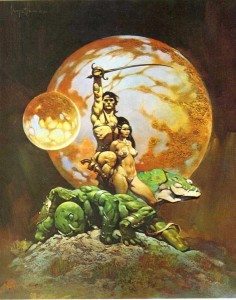
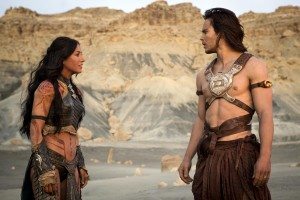
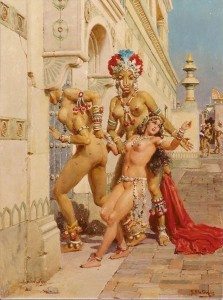


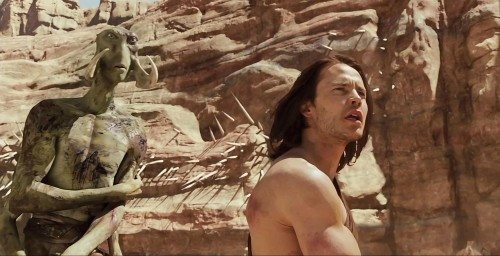
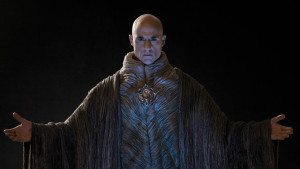
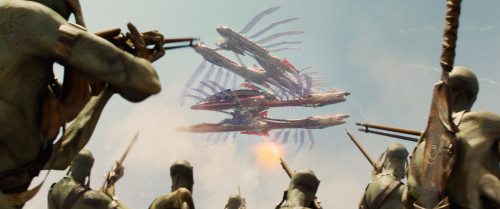
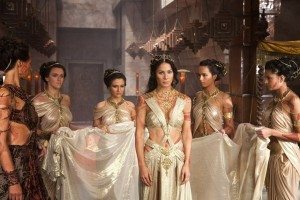
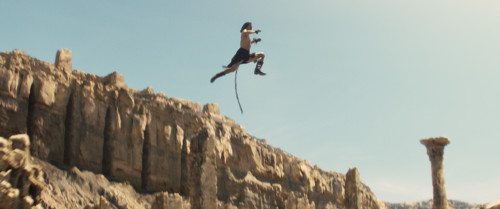
Yes. This movie is duller than very dull sand. The book relies on a somewhat tiring “AND THEN THIS HAPPENED!” cycle of adventure-per-chapter, but it’s interesting and fun.
John Carter should not, under any circumstances, be watched.
Speaking of which, I watched the first four minutes of Legend last night. I have no idea how you lasted longer than four minutes. That movie is mind-bogglingly dreadful.